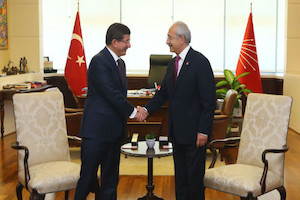Turkey Fifteen Years After: The AKP regime's power as context shaping
By Toni Alaranta
September 1, 2017
After fifteen years of Islamic-conservative state transformation, it is increasingly difficult to unmake the ideological-material powerbase that keeps the AKP in power. The state transformation project in Turkey has not only changed the circumstances within which any opposition group needs to operate, it has also, to a large extent, started to change the very language that can be used while addressing the most essential socio-political issues. One of the most explicit indications of the AKP’s ability to redefine the sociopolitical horizons is the worrisome lack of Western-inclined forces in Turkey. The Kemalist circles are arguably excessively nationalist. However, they, unlike the liberals, at least have a relatively coherent constituency and ideology for mass mobilization. And the liberals cannot hope to succeed in building a democratic society without a direct backing from some type of nationalist-inclined mass movement.

Turkey Today: A Democracy without Opposition
By Burak Bilgehan Özpek
February 28, 2017
The AKP regime has from the very beginning of its rule successfully deployed the tactic of defaming and delegitimizing opposition. But the tactic has ultimately been successful because those who have successively been targeted by the AKP – seculars, liberals, the left, Kurds – have also held each other’s demands or opposition to be illegitimate. Turkey’s democracy is thus crippled not only because the opposition has been defamed and even criminalized all along since the beginning of the AKP regime. It is the divisions in society that make authoritarianism possible.

Is the Kemalist Project to Blame for Turkey’s Failed Democracy?
By Toni Alaranta
February 17, 2017
It has become a commonplace to argue that Kemalism was a Turkish variant of right-wing nationalism with strong corporatist leanings and even fascist aspects. This is often compounded with the assertion that the Kemalist secularist state elite only sought to secure its own power and status in society, and that it only paid lip-service to Enlightenment ideals. It is pertinent to ask why the Kemalists would have embarked on a hugely unpopular project of culture revolution that threatened their hold on power by provoking a popular reaction, if they only sought to establish a right-wing dictatorship. The right-wing authoritarianism from which Turkey has suffered during most of its history has other sources.

Can “Constitutional Engineering” Once Again Succeed in Pacifying Turkey?
By Halil Karaveli
February 3, 2017
Historically in Turkey, there is a relationship between the rise of emancipation movements and “constitutional engineering”, between class- or ethnic-based challenges to the established order and the imposition of authoritarian constitutional arrangements in response. The authoritarian constitution of 1982 was the answer to the challenge of workers and peasants in the 1960s and 1970s. Today, a presidential system is supposed to neutralize the Kurdish challenge. However, it may be that Turkey’s ethnic fissure may prevent it from developing either democracy or stable authoritarian rule.
Turkish Islamism and Nationalism Before and after the Failed Coup Attempt
By Toni Alaranta
December 1, 2016
The debate on political Islam under the incumbent Justice and Development Party (AKP) needs to fully acknowledge the crucial importance of nationalism as the enduring element of any relevant form of mass politics in Turkey. In the Turkish case, it makes no sense to speak about political Islam distinct from nationalism as an overriding ideological component of modern politics. Just as much as the AKP’s political Islam utilizes religious texts, symbols and traditions, it also utilizes the familiar discourse of nationalism. This process was underway before the failed coup, but it has become more pronounced in its wake.






